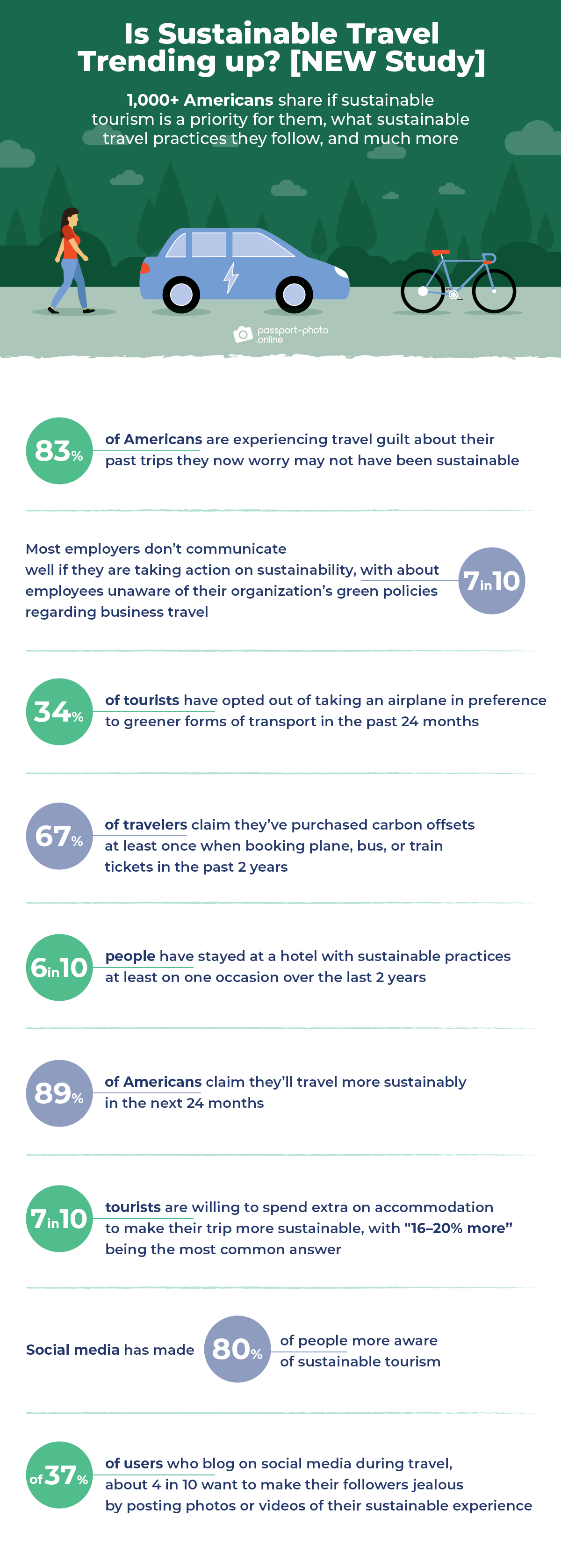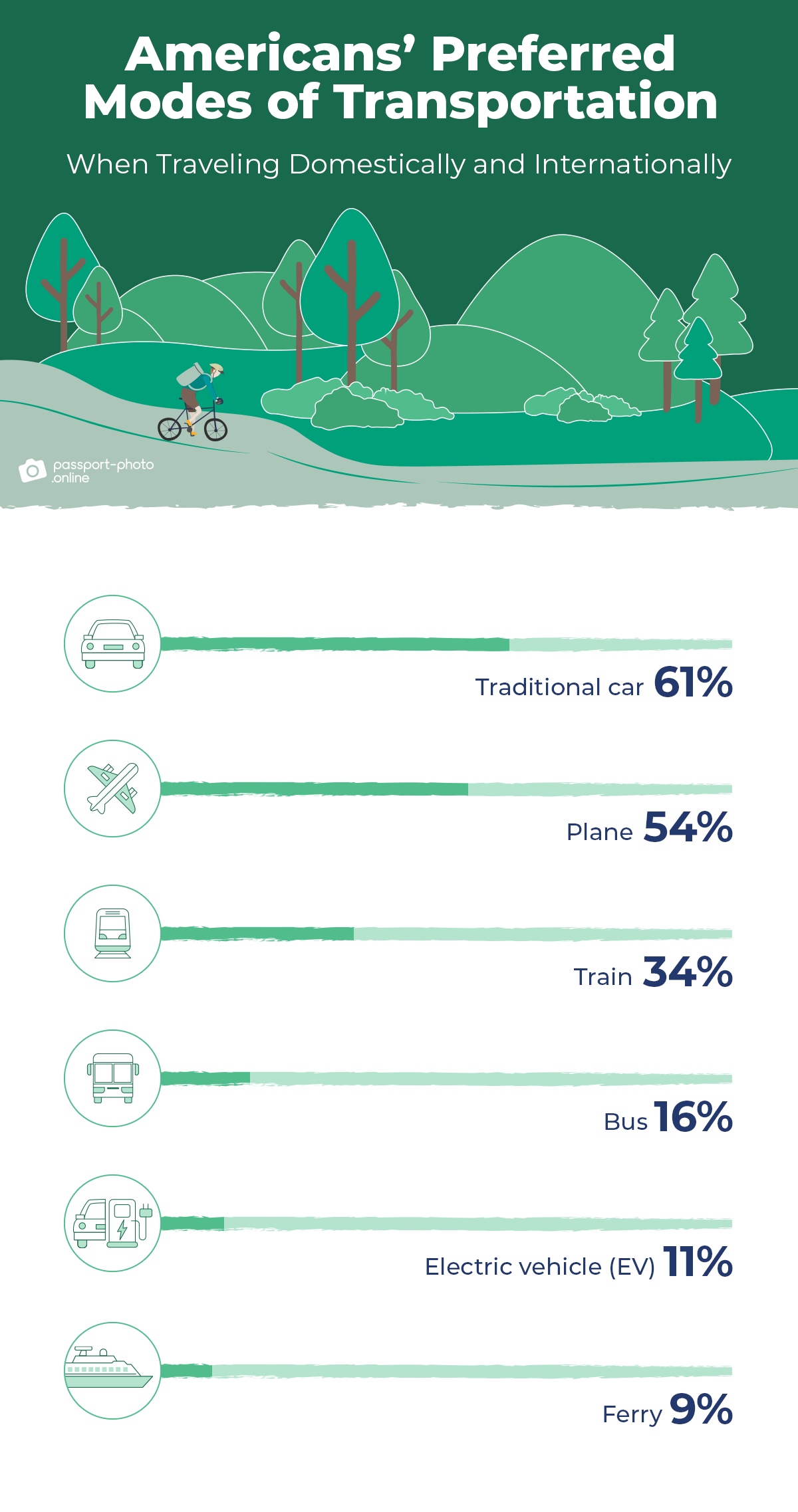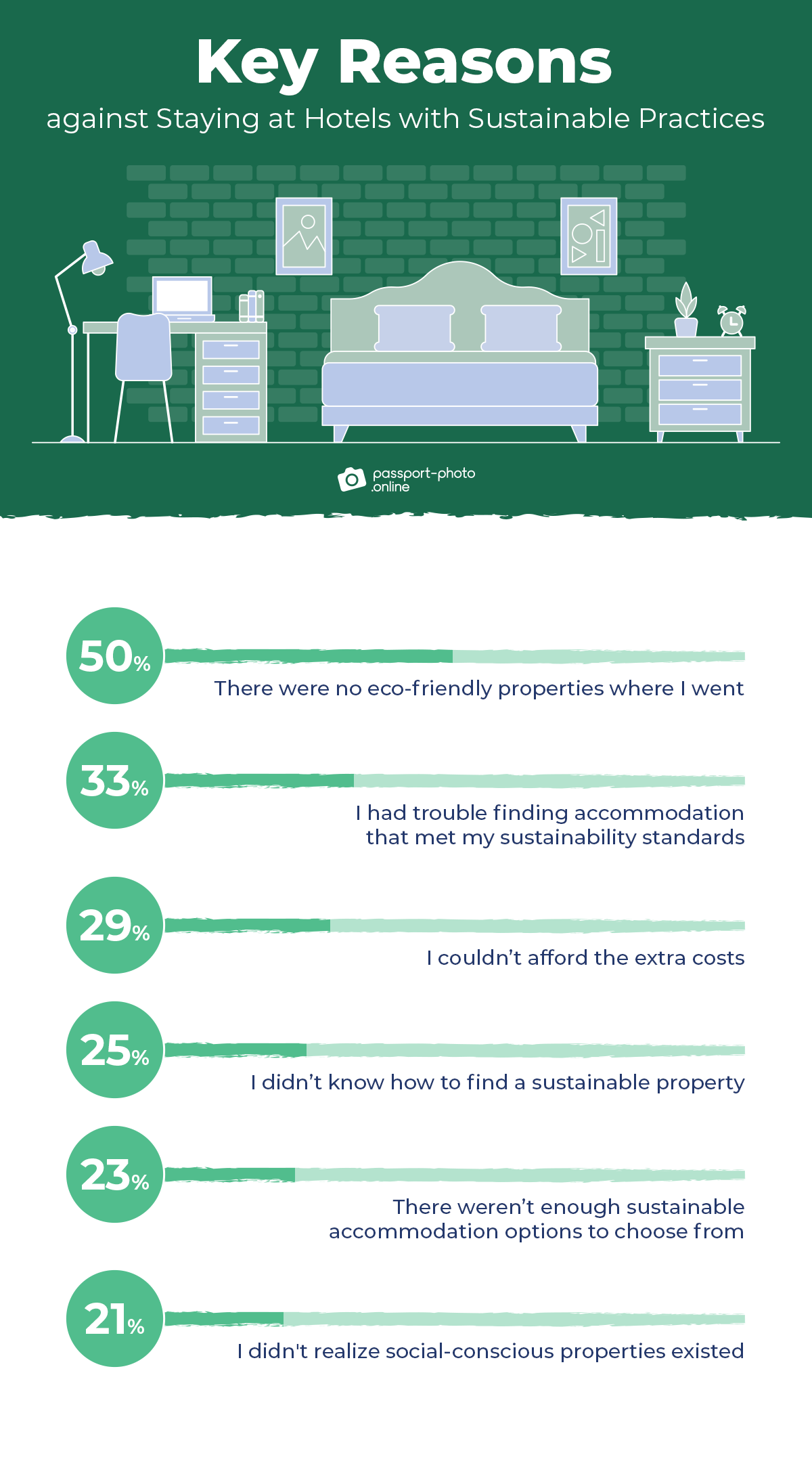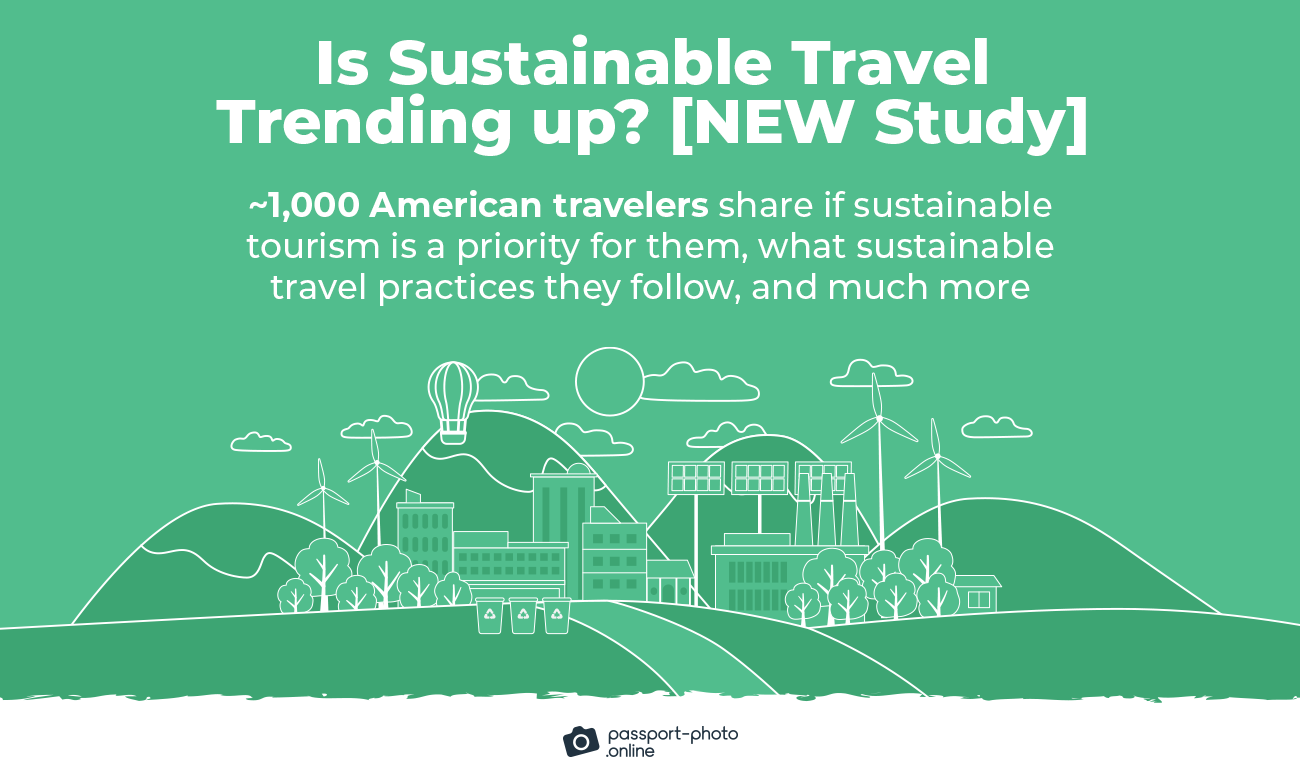COVID-19 has done a lot of bad things.
Yet—
It’s also put a spotlight on responsible travel and made people more aware of the impact of tourism on the environment.
That’s particularly true after we saw YouTube videos of wildlife roaming through abandoned airports and touristy streets during the lockdown. For many, it was a shocking reminder of how human activity could harm nature.
But now that coronavirus has receded into the background, is sustainable tourism still a priority? Or did “revenge travel” take the upper hand?
To find out, we’ve decided to survey over 1,000 Americans and uncover if they consider themselves eco-conscious, what green practices they stick to, and much more.
Scroll on.
Key Takeaways

- Nearly 83% of Americans are experiencing travel guilt about their past trips they now worry may not have been sustainable.
- Most employers don’t communicate well if they are taking action on sustainability, with about seven in 10 employees unaware of their organization’s green policies regarding business travel.
- Just 34% of tourists have opted out of taking an airplane in preference to greener forms of transport in the past 24 months.
- A full 67% of travelers claim they’ve purchased carbon offsets at least once when booking plane, bus, or train tickets in the past two years.
- Six in 10 people have stayed at a hotel with sustainable practices at least on one occasion over the last two years.
- Roughly 89% of Americans claim they’ll travel more sustainably in the next 24 months.
- Seven in 10 tourists are willing to spend extra on accommodation to make their trip more sustainable, with “16–20% more” being the most common answer.
- Social media has made 80% of people more aware of sustainable tourism.
- Of 37% of users who blog on social media during travel, about four in 10 want to make their followers jealous by posting photos or videos of their sustainable experience.
Cars Still Beat Planes, Buses, and Trains
Consider this:
By 2030, global transport-related CO2 emissions from tourism will likely grow 25% from 2016.
Is that a lot?
In short, yes. These emissions will represent 5.3% of all man-made emissions worldwide in 2030.
So—
For starters, we wanted to ask Americans what modes of transportation they typically use when traveling domestically and internationally. The goal was to see if they are aware of each form’s environmental impact and if they consciously take steps to lower their carbon footprint.
Below are the results (along with a text version just in case):

- Traditional car: 61%
- Plane: 54%
- Train: 34%
- Bus: 16%
- Electric vehicle (EV): 11%
- Ferry: 9%
Unsurprisingly, about six in 10 American travelers rely on gas-powered cars, which release ~4.6 metric tons of carbon dioxide annually and can hardly be considered eco-friendly. Air travel comes in a close second at 54%, remaining among the most polluting means of transport.
Finally, rail transportation ranks third at 34%, which, as you probably know, releases the least amount of greenhouse gasses.
The silver lining?
When we asked the survey respondents if they’d ever opted out of taking an airplane to get to their destination in preference to greener modes of transportation in the past 24 months, 34% said, “Yes.”
Plus, 67% of the survey takers claim they’ve purchased carbon offsets at least once when booking plane, bus, or train tickets in the past two years.
So while American travelers seem to be making promising strides toward being more eco-conscious, there’s still room to turn awareness into action.

Do you need passport photos? Find out more:
Most Americans Would Pay Extra for an Eco-Friendly Hotel Room
Now—
At this stage, we wanted to explore if travelers intentionally choose sustainable properties. After all, the hotel sector accounts for ~1% of global carbon emissions, so it’s always a good idea to pick accommodation with sustainable practices.
Thus, we asked the survey participants if they’d consciously stayed in eco-friendly accommodation at least once in the past 24 months.
Below are the results:
- Yes: 60%
- No: 25%
- Maybe: 15%
As the data shows, 60% of Americans have stayed at a hotel that follows sustainable practices at least once over the last two years. Of those, 38% pick such accommodation “sometimes,” and 37% report they “often” stay at green properties.
That’s not too bad.
Especially if you consider that 70% of US travelers are willing to spend extra on accommodation to make their trip more sustainable. Here’s how much:
- 16–20%: 33%
- 11–15%: 25%
- 6–10%: 21%
- 21% or more: 17%
- 0–5%: 4%
It’s also worth mentioning that 25% of the respondents said they hadn’t opted for sustainable hotels when traveling recently.
Here’s a list of the key reasons that give the why:

- There were no eco-friendly properties where I went: 50%
- I had trouble finding accommodation that met my sustainability standards: 33%
- I couldn’t afford the extra costs: 29%
- I didn’t know how to find a sustainable property: 25%
- There weren’t enough sustainable accommodation options to choose from: 23%
- I didn’t realize social-conscious properties existed: 21%
As you can tell, a lack of green properties at the destination is the leading reason why 50% of travelers go for regular hotels.
Perhaps it’s a good time for hoteliers to consider turning their businesses green to attract more eco-savvy guests.
Only Some Tourists Follow Green Practices during Their Stay
So far, so good.
Now that we’ve looked at American travelers’ preferred mode of transportation and their lodging preferences, let’s examine what green principles they stick to upon arrival at their destination.
To do it, we asked the survey participants eight yes or no questions, and the results came in as follows:
- 61% of Americans typically make a conscious decision to turn off the thermostat in their travel accommodation when they aren’t there.
- 65% switch off the lights when they aren’t using them.
- 60% turn off the tap when brushing their teeth at a hotel.
- 38% opt-out of daily room cleaning to lower water usage.
- 54% use a reusable water bottle to avoid buying bottled water while traveling.
- 43% reuse the same hotel towel(s) to reduce water usage.
- 32% shop at small, independent stores to support the local economy during their stay.
- 15% of travelers deliberately avoid traveling during the peak season to prevent overcrowding.
The takeaway?
About half of American travelers try to be eco-friendly while on vacation. But there are still many opportunities to improve, especially when it comes to supporting the local economy and avoiding peak season travel.
Social Media Has Its Role to Play in Sustainable Travel
Did you know?
About 31% of Americans would command between $5,001 and $10,000+ to quit social media for just one year, based on our other recent study.
That goes to show just how important social media has become for many of us.
But—what does it have to do with sustainable travel?
A lot, actually.
We’ve found that social media platforms have made 80% of Americans more aware of ecotourism. That’s not surprising, given that 37% blog about their own green travel experiences.
What is surprising is that of said 37%, about four in 10 travelers want to make their social media followers jealous by posting photos or videos of their sustainable travels.
So while it’s assumed we’re attracted to ecotourism to make environmentally and socially responsible choices, some might also be doing it for the likes.
Ouch.
Employers Lag on Sustainability
Based on Deloitte’s recent findings, corporate travel is below 50% of pre-pandemic levels.
That makes sense. After all, most companies continue to operate in a remote or hybrid capacity, often relying on video conferencing than physical interaction.
That said, some business travel is still around. Our own research goes hand-in-hand with Deloitte’s and reveals that only 46% of companies regularly send employees on work trips.
But—
What we wanted to unearth was whether businesses in the US stick to green policies in the context of corporate travel.
So we asked the survey takers, “Does your company purchase carbon offsets when booking plane/bus/train tickets for employees going on business trips?”
Below are the results:
- I don’t know: 73%
- Yes: 20%
- No: 7%
As a follow-up, we asked, “When booking accommodation for employees going on business trips, which of the following does your company typically choose?”
See the results below:
- I don’t know: 76%
- Accommodation with sustainability practices: 15%
- Traditional property: 9%
The bottom line?
Most companies don’t communicate well if they are taking action on sustainability, with about seven in 10 employees unaware of their organization’s green policies regarding business travel.
So employers, take note!
Most US Travelers Experience Travel Guilt
You’ve made it to the end.
Phew.
But—before we’re over and out, we wanted to share two more findings that might shed some more light on where responsible travel is headed:
- 89% of Americans claim they’ll travel more sustainably in the next 24 months.
- 83% of travelers are experiencing “travel guilt” about their past trips they now worry may not have been sustainable.
What does this tell us?
Ecotourism is here to stay, with more and more Americans jumping on the bandwagon shortly.
While it’ll likely lead to a surge in sustainable options, we could also see more “greenwashing,” where businesses make unsubstantiated environmental claims to capitalize on the eco-friendly movement.
Only time will tell.
Stacking It All Up
There you have it.
An in-depth look at sustainable travel in North America.
Now—was your last trip sustainable? If so, what steps did you take to avoid harming the environment of your destination?
Let us know in the comments below.
Methodology
We conducted an online survey of 1,039 US respondents via a bespoke online polling tool in August 2022.
The respondents were 63.5% male and 36.5% female. 9.1% of respondents were 25 or younger, 54.8% were aged 26–38, 26.9% were aged 39–54, and 9.2% were 55 or older.
This survey has a confidence level of 95% and a margin of error of 3%. Given the gender and age makeup of our sample size, the study’s findings are statistically significant for the population at large.
This study was created through multiple steps of research, crowdsourcing, and surveying. Data scientists reviewed all survey participants’ responses for quality control. The survey also had an attention-check question.
Fair Use Statement
Did our findings help you learn more about sustainable travel? If you believe your audience will be interested in this information, feel free to share it. Just remember to mention the source and link back to this page.
Sources
- Deloitte, “Reshaping the Landscape: Corporate Travel in 2022 and Beyond”
- EPA, “Greenhouse Gas Emissions from a Typical Passenger Vehicle”
- Statista, “Carbon Dioxide Emissions from Tourism-Related Transport Worldwide in 2005 and 2016, with a Forecast for 2030”
- Statista, “Transport-Related Emissions from International Tourist Arrivals Worldwide in 2005 and 2016, with a Forecast for 2030, by Mode of Transport”
- Sustainable Hospitality Alliance, “Climate Action – Reducing Emissions across the Hospitality Industry”
- Woolf M., “Scrolling Social Media for Dopamine [2022 Study]”

As a Digital PR specialist and a member of the Society of Professional Journalists (SPJ), Max has 5+ years of writing experience.
Over the course of his career, Max’s work has garnered significant attention, with features in numerous prominent publications such as The New York Times, Forbes, Inc., Business Insider, Fast Company, Entrepreneur, BBC, TechRepublic, Glassdoor, and G2.









